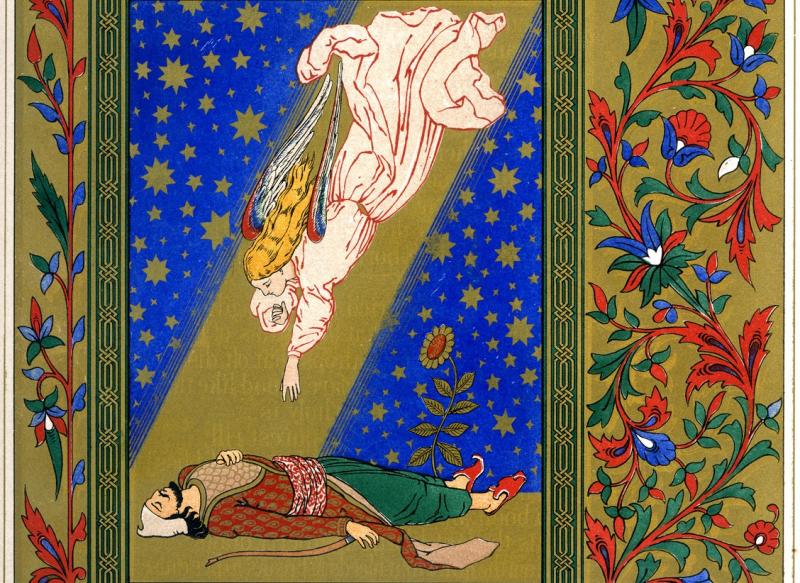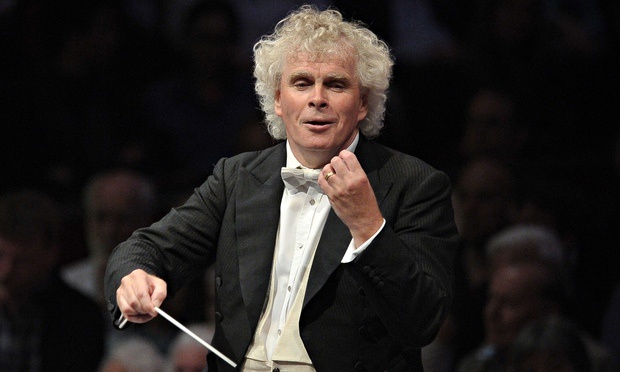Das Paradies und die Peri, LSO, Rattle, Barbican | reviews, news & interviews
Das Paradies und die Peri, LSO, Rattle, Barbican
Das Paradies und die Peri, LSO, Rattle, Barbican
Starry line-up makes the best possible case for Schumann’s great oratorio

Sir Simon Rattle wants you to hear Das Paradies und die Peri. He is convinced that Schumann’s oratorio is one of the great undiscovered masterpieces of the Romantic era. To that end, he has led performances with the Berlin Philharmonic and an all-star cast, and has now brought that cast to London to convert the Brits.
He’s right. It is magnificent, and last night it received as good a performance as could be imagined. Every strength of Schumann’s art is showcased. The solo vocal writing is emotive and imaginative. The chorus is used prominently, and to excellent effect. The orchestration, true to Schumann’s approach, is skilful without being ostentatious. And, unlike so many other opera/cantata/oratorio hybrids of the era, it holds together well, with a clear structure, but enough harmonic and textural surprises to prevent it from ever seeming formulaic. The one major weakness is the libretto, an Orientalist confection based on Persian mythology. It is of little consequence or interest, and the music can be appreciated without too much concern about the narrative, slender as it is.
 Among an impressively strong cast, the standout performance came from Sally Matthews (pictured right by Johan Persson) as the eponymous Peri, the spirit whose heavenly transcendence is the subject of the plot. Her delivery is powerful and clear, her tone rich and complex. Even in this quite staid oratorio context, this was a performance of operatic drama and engagement. Mark Padmore’s narrator stood back a little by comparison, but his too was an impressive reading, somewhere between Bach’s Evangelist and Schumann’s Dichter, never dominating but always engaging. Among the other soloists, Kate Royal struggled to match Matthews, in part because her tone was more fragile, but also her music was less interesting. She and Bernarda Fink, Andrew Staples and Florian Boesch each have an aria and combine for various ensembles, all to good effect.
Among an impressively strong cast, the standout performance came from Sally Matthews (pictured right by Johan Persson) as the eponymous Peri, the spirit whose heavenly transcendence is the subject of the plot. Her delivery is powerful and clear, her tone rich and complex. Even in this quite staid oratorio context, this was a performance of operatic drama and engagement. Mark Padmore’s narrator stood back a little by comparison, but his too was an impressive reading, somewhere between Bach’s Evangelist and Schumann’s Dichter, never dominating but always engaging. Among the other soloists, Kate Royal struggled to match Matthews, in part because her tone was more fragile, but also her music was less interesting. She and Bernarda Fink, Andrew Staples and Florian Boesch each have an aria and combine for various ensembles, all to good effect.
The choral writing is perhaps the most complex and sophisticated aspect of the work, with adventurous harmonies and unusual tessitura. The London Symphony Chorus gave a masterful performance. The more euphonious music, like the chorus that ends the second part, was particularly satisfying, but the greater skill was shown in the more intricate music, the polyphonic entries with which the chorus first enters, and the subtle accompaniments later on beneath Matthews’s fioriture.
 Singing more than playing is the order of the day here, so the LSO was wise to field a relatively small ensemble, which balanced well and offered an accompaniment of classical elegance, only occasionally rising to more emphatic drama. Particularly impressive were the horn and trombone sections, each given a few short moments to shine, and both doing so spectacularly.
Singing more than playing is the order of the day here, so the LSO was wise to field a relatively small ensemble, which balanced well and offered an accompaniment of classical elegance, only occasionally rising to more emphatic drama. Particularly impressive were the horn and trombone sections, each given a few short moments to shine, and both doing so spectacularly.
But best of all was Rattle himself (pictured above by Chris Christodoulou). His passion for this piece was obvious from his every gesture, and for much of the work he could be seen silently mouthing the words along with the singers. Technically, his conducting was flawless, and his ability to negotiate Schumann’s often abrupt transitions gave the piece a sense of flow it may otherwise have lacked. His communication with the musicians is direct and powerful, the result more of a shared passion than of any histrionics at the podium. The London Symphony Orchestra and Chorus perform well for many different conductors, but never better than they do for him.
rating
Explore topics
Share this article
Add comment
The future of Arts Journalism
You can stop theartsdesk.com closing!
We urgently need financing to survive. Our fundraising drive has thus far raised £49,000 but we need to reach £100,000 or we will be forced to close. Please contribute here: https://gofund.me/c3f6033d
And if you can forward this information to anyone who might assist, we’d be grateful.

Subscribe to theartsdesk.com
Thank you for continuing to read our work on theartsdesk.com. For unlimited access to every article in its entirety, including our archive of more than 15,000 pieces, we're asking for £5 per month or £40 per year. We feel it's a very good deal, and hope you do too.
To take a subscription now simply click here.
And if you're looking for that extra gift for a friend or family member, why not treat them to a theartsdesk.com gift subscription?
more Classical music
 From Historical to Hip-Hop, Classically Black Music Festival, Kings Place review - a cluster of impressive stars for the future
From quasi-Mozartian elegance to the gritty humour of a kitchen inspection
From Historical to Hip-Hop, Classically Black Music Festival, Kings Place review - a cluster of impressive stars for the future
From quasi-Mozartian elegance to the gritty humour of a kitchen inspection
 Shibe, LSO, Adès, Barbican review - gaudy and glorious new music alongside serene Sibelius
Adès’s passion makes persuasive case for the music he loves, both new and old
Shibe, LSO, Adès, Barbican review - gaudy and glorious new music alongside serene Sibelius
Adès’s passion makes persuasive case for the music he loves, both new and old
 Anja Mittermüller, Richard Fu, Wigmore Hall review - a glorious hall debut
The Austrian mezzo shines - at the age of 22
Anja Mittermüller, Richard Fu, Wigmore Hall review - a glorious hall debut
The Austrian mezzo shines - at the age of 22
 First Person: clarinettist Oliver Pashley on the new horizons of The Hermes Experiment's latest album
Compositions by members of this unusual quartet feature for the first time
First Person: clarinettist Oliver Pashley on the new horizons of The Hermes Experiment's latest album
Compositions by members of this unusual quartet feature for the first time
 Gesualdo Passione, Les Arts Florissants, Amala Dior Company, Barbican review - inspired collaboration excavates the music's humanity
At times it was like watching an anarchic religious procession
Gesualdo Passione, Les Arts Florissants, Amala Dior Company, Barbican review - inspired collaboration excavates the music's humanity
At times it was like watching an anarchic religious procession
 Classical CDs: Camels, concrete and cabaret
An influential American composer's 90th birthday box, plus British piano concertos and a father-and-son duo
Classical CDs: Camels, concrete and cabaret
An influential American composer's 90th birthday box, plus British piano concertos and a father-and-son duo
 Cockerham, Manchester Camerata, Sheen, Martin Harris Centre, Manchester review - re-enacting the dawn of modernism
Two UK premieres added to three miniatures from a seminal event of January 1914
Cockerham, Manchester Camerata, Sheen, Martin Harris Centre, Manchester review - re-enacting the dawn of modernism
Two UK premieres added to three miniatures from a seminal event of January 1914
 Kempf, Brno Philharmonic, Davies, Bridgewater Hall, Manchester review - European tradition meets American jazz
Bouncing Czechs enjoy their Gershwin and Brubeck alongside Janáček and Dvořák
Kempf, Brno Philharmonic, Davies, Bridgewater Hall, Manchester review - European tradition meets American jazz
Bouncing Czechs enjoy their Gershwin and Brubeck alongside Janáček and Dvořák
 Solomon, OAE, Butt, QEH review - daft Biblical whitewashing with great choruses
Even a top soprano and mezzo can’t make this Handel paean wholly convincing
Solomon, OAE, Butt, QEH review - daft Biblical whitewashing with great choruses
Even a top soprano and mezzo can’t make this Handel paean wholly convincing
 Two-Piano Gala, Kings Place review - shining constellations
London Piano Festival curators and illustrious friends entertain and enlighten
Two-Piano Gala, Kings Place review - shining constellations
London Piano Festival curators and illustrious friends entertain and enlighten
 Echo Vocal Ensemble, Latto, Union Chapel review - eclectic choral programme garlanded with dance
Beautiful singing at the heart of an imaginative and stylistically varied concert
Echo Vocal Ensemble, Latto, Union Chapel review - eclectic choral programme garlanded with dance
Beautiful singing at the heart of an imaginative and stylistically varied concert
 Scott, Irish Baroque Orchestra, Whelan, RIAM, Dublin review - towards a Mozart masterpiece
Characteristic joy and enlightenment from this team, but a valveless horn brings problems
Scott, Irish Baroque Orchestra, Whelan, RIAM, Dublin review - towards a Mozart masterpiece
Characteristic joy and enlightenment from this team, but a valveless horn brings problems

Comments
Good lord, can seven years
I thought Bernarda Fink was